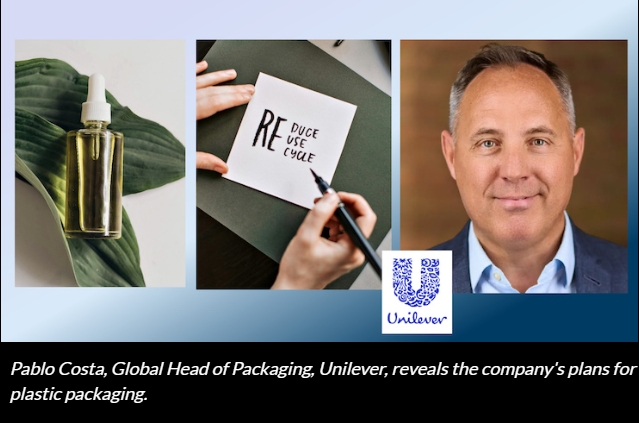
2024-06-20 13:56:34
Unilever Updates Sustainable Packaging Goals
2024-06-20 13:56:34
 Pablo Costa, Global Head of Packaging at Unilever, discusses how the company's sustainability agenda has evolved—and how it affects its use of plastic packaging.
Pablo Costa, Global Head of Packaging at Unilever, discusses how the company's sustainability agenda has evolved—and how it affects its use of plastic packaging.
"Packaging is vital for our business...It’s also central to the experience of our consumers and to delivering unmissable superior brands."Part of the problem is the lack of infrastructure for plastic recycling—and the lack of government regulations, Costa notes.
"But we know that the sourcing, use and end-of-life of our packaging must be carefully considered and designed to have a positive impact on our planet and society."
—Pablo Costa, Global Head of Packaging, Unilever
Unilever has solutions, Costa says. He explains the company's updated sustainable packaging goals. Read on.
Unilever's New Growth Action Plan
Costa outlines how Unilever identified plastic as one of its four sustainability priorities in its Growth Action Plan. The company has already successfully hit key milestones, including:- Reducing its use of virgin plastic by 18% against a 2019 baseline.
- Increased its use of recycled plastic to 22% of its global plastic packaging portfolio. This puts Unilever on track to meet its 25% goal by 2025.
- Focusing on long-term partnerships—Unilever was the first major FMCG to sign the Global Commitment. Unilever also partnered with the Consumer Goods Forum’s Plastic Waste Coalition of Action to create the Golden Design Rules for optimal plastic packaging design, production and recycling.
What's Next? Unilever's New Goals
Costa says that Unilever aims to:- Reduce virgin plastic use by 30% in 2026 and by 40% in 2028.
- Work to ensure that 100% of our plastic packaging is reusable, recyclable or compostable, by 2030 for rigid plastic, and by 2035 for flexibles
- For rigid plastic, approximately 87% is designed for recycling. Unilever will now focus on the more challenging non-recyclable components, such as caps, aerosol actuators, and bottle pumps.
'We Can't Do This Alone'
Costa points out the need for stronger, harmonized regulations to "level the playing field" for all businesses."We’re calling on governments to accelerate the implementation of mandatory and well-designed extended producer responsibility (EPR) schemes, which hold businesses to account for the packaging choices they make," Costa says.
He explains that Unilever is also asking governments to agree to well-designed reuse policies, tailored to markets and categories.
"What we know for sure is we can’t do this alone," he says.
Read Costa's news statement in its entirety here on Unilever's site.
Photos: L-R: Pexels—by Vlada Karpovich and PNW Production; Pablo Costa, Global Head of Packaging at Unilever.
LinkedIn




